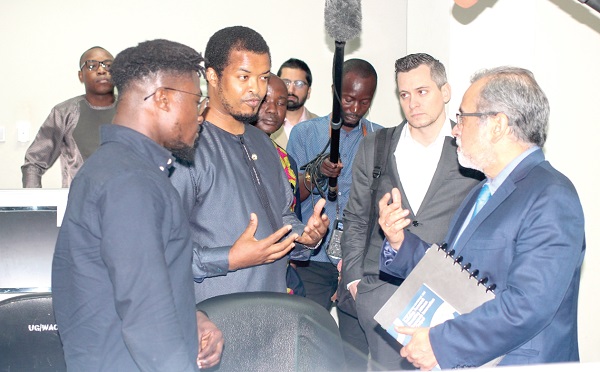
Centres of Excellence achievements commendable
A delegation from the World Bank last Friday visited two Africa Centres of Excellence (ACEs) for Development Impact at the University of Ghana to study how the project funds had been utilised.
In 2015, the World Bank, in collaboration with countries in West and Central Africa, launched the ACEs project to, among others, train crop improvement scientists and agripreneurs to stimulate growth in the agricultural sector, enhance research and development in food security and socio-economic development and support the centres to improve the quality and relevance of course offerings and research.
Advertisement
The centres visited were the West African Centre for Cell Biology of Infectious Pathogens (WACCBIP) and the West African Centre for Crop Improvement (WACCI).
The two centres and seven others across the country are under a $60-million ACEs project which was approved on March 27, 2019 and became effective in August 2019.
Ghana's ACEs are training people at the master’s and doctor of philosophy (PhD) levels and in professional short courses.
The centres are also pursuing research in areas such as coastal resilience, infectious and genetic diseases, food security, energy and environmental sustainability and water and sanitation.
Ghana’s performance laudable
The visit, led by the World Bank’s Global Director for Education, Dr Jaime Saavedra, afforded the delegation the opportunity to interact with the Ghanaian students, as well as students from the sub-region, who then shared their academic experiences and postgraduate plans.
Dr Saavedra, a Peruvian economist, speaking during the visit, lauded the performances of the nine centres across the country, saying, for instance, that WACCBIP had successfully sequenced genomes of COVID-19 and also provided free screening for exposure to COVID-19 in various suburbs in Ghana as part of its COVID-19 Seroprevalence Study.
He said the African Centre of Excellence in Coastal Resilience (ACECOR) at the University of Cape Coast had also worked with the Department of Fisheries and Aquatic Sciences of the university and local non-governmental organisations (NGOs) to provide rapid global response to a mass stranding of marine mammals in Axim.
Human capital
On building human capital, Dr Saavedra, who oversees the World Bank’s $20-billion portfolio of education financing, called for the prioritisation of investment in basic, technical and higher education in the country.
He also suggested that the country could use the tertiary educational system to give second chances to many students who did not get the right basic education, as well as young people who did not have the skills but had all the potential to receive training.
“It is essential that we continue building the human capital for growth and development in agriculture in a sustained fashion in the country,” Dr Saavedra, who served as Peru’s Minister of Education twice across two administrations, said, and commended the centres for not only training the students but also giving them the chance to do their research work and finding development solutions.
He expressed the World Bank’s commitment to continue to support the policies of governments on education by empowering young entrepreneurs.
Support
The Founding Director of WACCI, Professor Eric Yirenkyi Danquah, said the crop improvement centre was committed to improving food security in Africa by equipping plant breeders with the knowledge and skills to develop superior varieties of indigenous crops, using both conventional and modern technologies.
He said the centre had developed and commercialised over 180 pest and drought or climate change resilient varieties of crops, including the release of high-yielding hybrid varieties of tomato and white maize.
Prof. Danquah called on the government to prioritise investment in agriculture and higher education to ensure that the country was self-sufficient.
The Director of Research at WACCBIP, Dr Peter Quarshie, thanked the team for the support and said the funding from the World Bank had helped the centre train students in the sciences.
He said WACCBIP had also successfully sequenced over 1,500 genomes of COVID-19 and also diagnosed the gene mutation responsible for hearing impairment, after which they developed a diagnostic test to screen new-born babies for the gene.



